牛津译林版九年级上册Unit 3 Teenage problems Integrated skills & Study skills课件 (共29张PPT,内嵌音频)
文档属性
| 名称 | 牛津译林版九年级上册Unit 3 Teenage problems Integrated skills & Study skills课件 (共29张PPT,内嵌音频) |
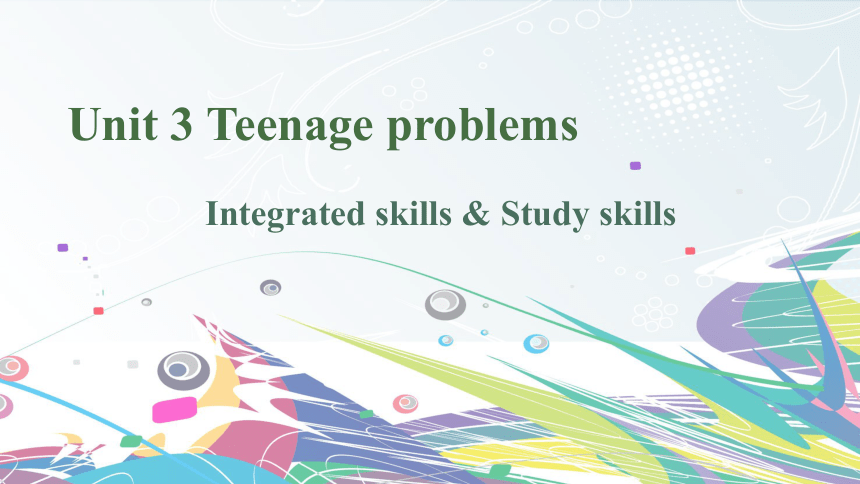
|
|
| 格式 | pptx | ||
| 文件大小 | 3.4MB | ||
| 资源类型 | 教案 | ||
| 版本资源 | 牛津译林版 | ||
| 科目 | 英语 | ||
| 更新时间 | 2023-08-07 00:00:00 | ||
图片预览

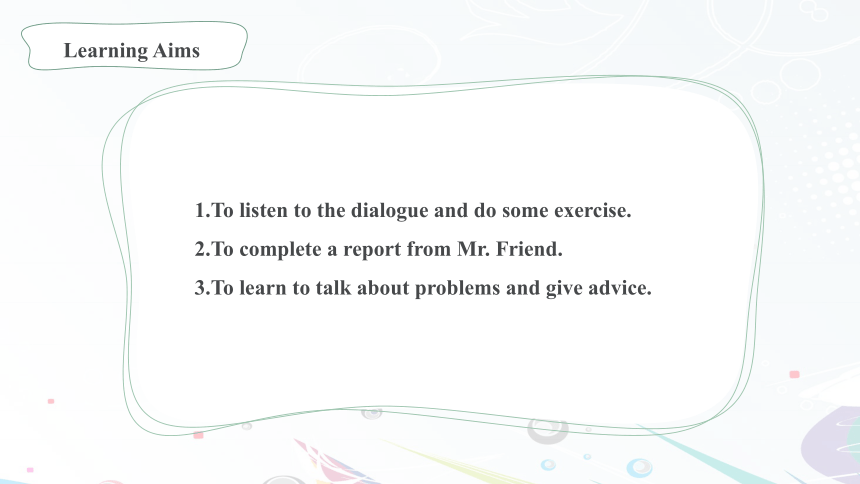
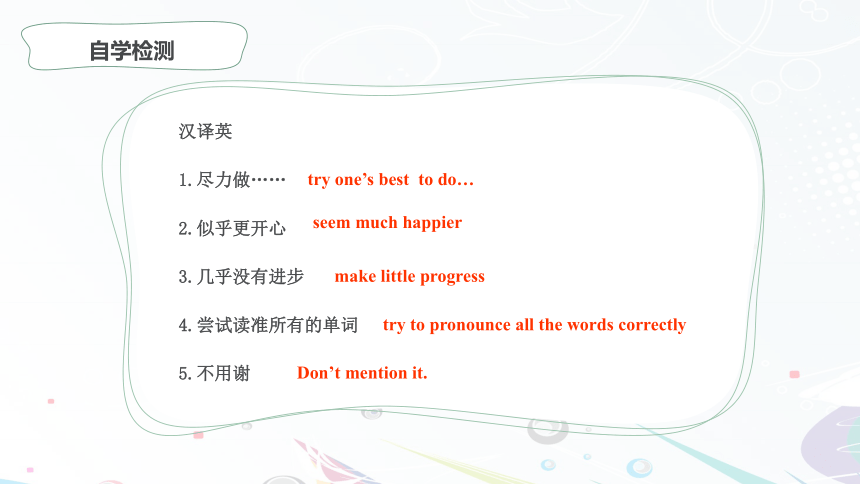
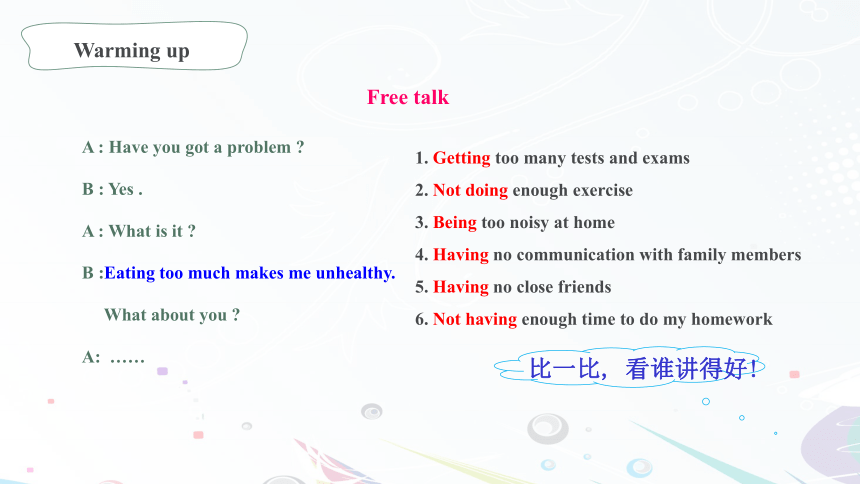
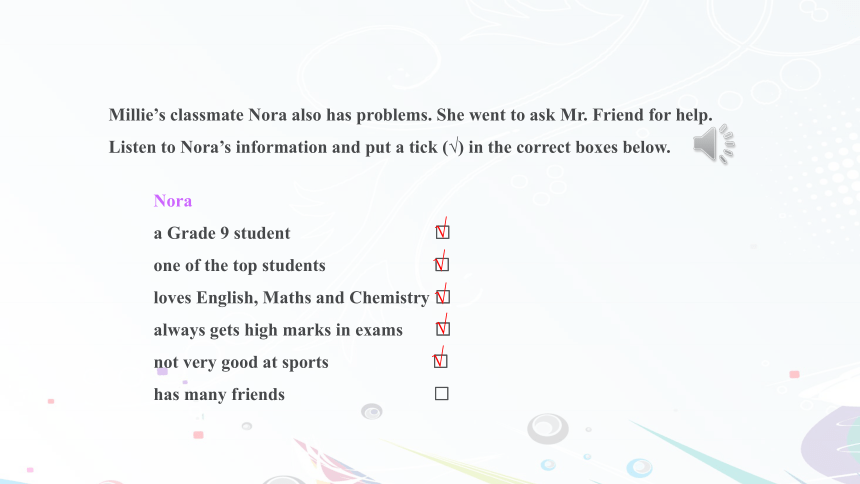
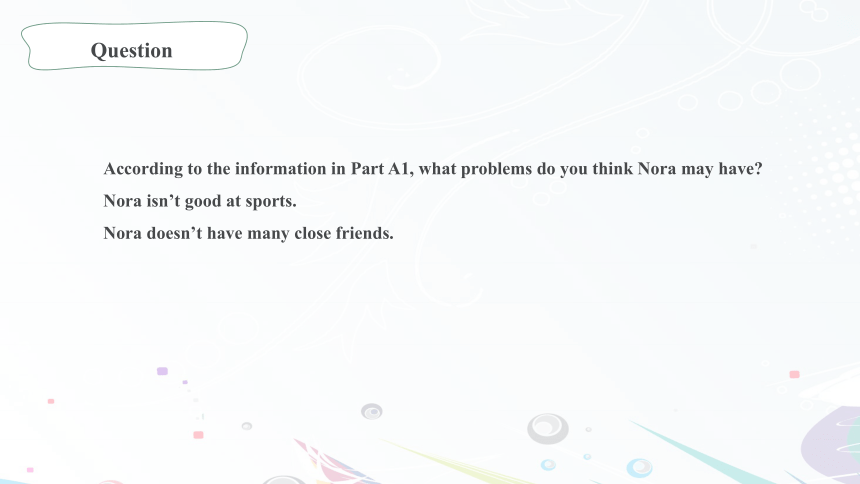
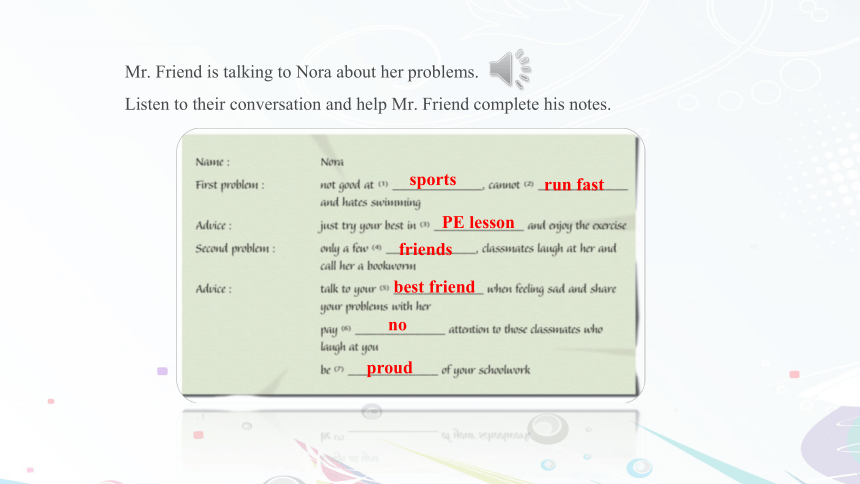

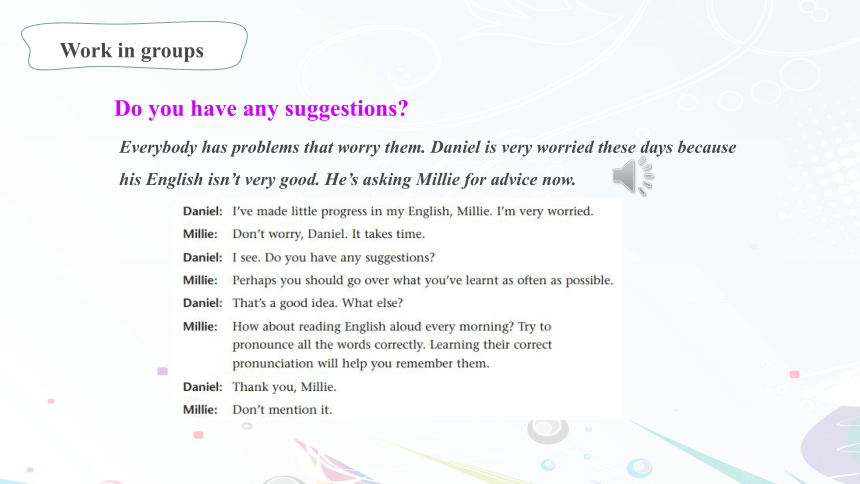
文档简介
(共29张PPT)
Integrated skills & Study skills
Unit 3 Teenage problems
Learning Aims
1.To listen to the dialogue and do some exercise.
2.To complete a report from Mr. Friend.
3.To learn to talk about problems and give advice.
自学检测
汉译英
1.尽力做……
2.似乎更开心
3.几乎没有进步
4.尝试读准所有的单词
5.不用谢
try one’s best to do…
seem much happier
make little progress
try to pronounce all the words correctly
Don’t mention it.
A : Have you got a problem
B : Yes .
A : What is it
B :Eating too much makes me unhealthy.
What about you
A: ……
1. Getting too many tests and exams
2. Not doing enough exercise
3. Being too noisy at home
4. Having no communication with family members
5. Having no close friends
6. Not having enough time to do my homework
比一比, 看谁讲得好!
Free talk
Warming up
Millie’s classmate Nora also has problems. She went to ask Mr. Friend for help. Listen to Nora’s information and put a tick (√) in the correct boxes below.
Nora
a Grade 9 student □
one of the top students □
loves English, Maths and Chemistry □
always gets high marks in exams □
not very good at sports □
has many friends □
√
√
√
√
√
According to the information in Part A1, what problems do you think Nora may have
Nora isn’t good at sports.
Nora doesn’t have many close friends.
Question
Mr. Friend is talking to Nora about her problems.
Listen to their conversation and help Mr. Friend complete his notes.
sports
run fast
PE lesson
friends
best friend
no
proud
Mr. Friend is writing a report on Nora’ s visit. Help him complete the report. Use the information on page 43 to help you.
Nora is one of the ____________in her class at Sunshine Secondary School. Her favorite subjects are _______, ________ and _________.
Nora does well in exams, but she still has some problems. She is not very good at sports. She cannot _________ and hates ___________.
Also, sometimes her classmates ________ her and call her a bookworm. This makes her feel sad.
I told her what to do in PE lessons. She should just ______________ and ________________. I also told her to __________________ the classmates who laugh at her.
Now Nora seems much happier than before. She still finds sport difficult, but she can talk to her best friend Betty when she feels sad and __________________ with her. She should be _________ her schoolwork.
top students
English
Chemistry
Maths
run fast
swimming
laugh at
try her best
enjoy the exercise
pay no attention to
share her problems
proud of
Do you have any suggestions
Everybody has problems that worry them. Daniel is very worried these days because his English isn’t very good. He’s asking Millie for advice now.
Work in groups
Read the conversation and answer the questions.
1. What is Daniel’s problem
He has made little progress in his English.
2. What advice does Millie give Daniel
Daniel should go over what he has learnt as often as possible.
He should read English aloud every morning and try to pronounce all the words correctly.
3. Why does Millie ask Daniel to pronounce all the words correctly
Because learning the correct pronunciation will help him remember words.
4. Do you think Daniel feels better after discussing his problem with Mille
Yes.
not enough sleep
getting low marks
quarrelling with parents
too many tests and exams
be laughed by the classmates
…
Some problems
Expressing feelings
1. I feel angry/sad/worried/upset when…
2. I feel like…
3. I’m worried about…
Useful expressions
Asking for help
1. Can you give me some advice
2. What do you think
3. Can you help me
4. What should I do
5. What’s your suggestion
Expressing sympathy
1. I’m sorry to hear that.
2. Oh dear, I’m sorry.
3. I’m sorry. Can I help
Giving suggestions/advice
1. My suggestion/advice is to…
2. I think you should…
3. Why don’t you… /Why not …
4. What/How about …
1. I’m very worried. 我非常担心。
worried adj. 担心的, 烦恼的
可用于系表结构, 主语一般是人。
be worried about sth. /sb
worrying adj. 令人担忧的, 令人担心的
主语一般为事物。
worry v. 担心
worry (about) sth./ sb.
Language points
2. Perhaps you should go over what you’ve learnt as often as possible.
也许你应该尽可能多地复习你已经学习过的知识。
go over 复习; 回顾
e.g. Go over the text before the exam.
考试前复习课文。
Language points
aloud是副词, 与read, think 连用时, 表示“出声读”或“把想到的自言自语地说出来”, 不涉及声音的大小。当aloud与shout等词连用时, 才表示“大声地”。它通常放在动词之后, 没有比较级和最高级形式。例如:
Don’t read aloud in the reading room.
3. aloud/loud/loudly
Language points
Most of the children and the old people like to think aloud.
She shouted aloud when she saw her lost son.
loud 可作形容词或副词, 表示“高声的(地), 响亮的(地)”。当它作形容词时, 可作表语或定语; 当它作副词时, 常与speak, talk等词连用, 强调状态和给人的感觉, 通常放在动词之后, 有比较级和最高级形式。例如:
Language points
The noise is loud enough to wake us up.
The man has a loud voice.
The teacher told us to speak a little louder.
Don’t talk so loud.
loudly 是副词, 有时可与loud 通用, 但比loud更正式些, 常位于动词之后, 有比较级和最高级形式。例如:
Don’t talk so loudly.
“Listen!” he said more loudly than ever. “That’s not true!
Language points
4. Try to pronounce all the words correctly.
努力把所有单词读正确。
correctly adv. 正确地
correct adj. 正确的; 恰当的
the correct answer 正确答案
v. 改正; 纠正
correct mistakes 改正错误
Language points
5. Don’t mention it.
不客气。
mention vt. 提及; 说起
同样的说法还有:
With pleasure.
You’re welcome.
That’s all right.
Language points
Everybody has problems that worry them. Work in pairs. Take turns to share your problems and give advice. Use Millie and Amy’s conversation as a model.
Writing
To predict is to guess what comes next. It helps us understand what kinds of
books or articles we are reading, and where we might find information.
When we read an article, we can often predict the content from the title. We
can also use the headings in an article to predict the main idea of each part.
Headings are the titles of the different parts. Often, they are in bold.
There is an article called “The trouble with teenagers”. Predict the points
that will be talked about in the article and tick ( ) the correct boxes.
√
√
√
√
√
√
√
d
e
f
a
b
c
Millie is reading an article in Teenagers magazine. Match her questions with
your predicted answers. Write the correct letter in each blank
Exercises
Do the exercises online!
Unit 3-Integrated skills & Study skills随堂检测
Exercises
根据句意及汉语提示, 写出所缺单词。
1. The teacher is teaching us how to _____________(发音) these new words.
2. Bob read the letter ___________(大声地) to his grandfather.
3. Mrs. Lee is very happy that Daniel has made great ____________(进步) in his English.
4. Have you looked up the magazine he ____________(说起) yesterday
5. Parents will be ___________(担心的) if their children come home late.
pronounce
aloud
worried
progress
mentioned
Exercises
选择题。
1.The girl asked if they __ some food and drink with them
A. took B. take C. takes D. will take
2.She asked Linda if __ go and get some food.
A. could she B. she could
C. she can D. she may
3.I don’t know __ he still lives here after so many years.
A. whether B. where C. what D. when
4.Do you know __ they listened to yesterday evening
A. what B. when C. why D. how
A
B
A
A
Exercises
5.He asked me __ told me the accident.
A. when B. which
C. who D. whose
6.Please tell me __ last year.
A. where does your sister work
B. where did your sister work
C. where your sister works
D. where your sister worked
C
D
Homework
1.Recite new words and phrases.
2.Preview Unit 3-Task
再见!
Integrated skills & Study skills
Unit 3 Teenage problems
Learning Aims
1.To listen to the dialogue and do some exercise.
2.To complete a report from Mr. Friend.
3.To learn to talk about problems and give advice.
自学检测
汉译英
1.尽力做……
2.似乎更开心
3.几乎没有进步
4.尝试读准所有的单词
5.不用谢
try one’s best to do…
seem much happier
make little progress
try to pronounce all the words correctly
Don’t mention it.
A : Have you got a problem
B : Yes .
A : What is it
B :Eating too much makes me unhealthy.
What about you
A: ……
1. Getting too many tests and exams
2. Not doing enough exercise
3. Being too noisy at home
4. Having no communication with family members
5. Having no close friends
6. Not having enough time to do my homework
比一比, 看谁讲得好!
Free talk
Warming up
Millie’s classmate Nora also has problems. She went to ask Mr. Friend for help. Listen to Nora’s information and put a tick (√) in the correct boxes below.
Nora
a Grade 9 student □
one of the top students □
loves English, Maths and Chemistry □
always gets high marks in exams □
not very good at sports □
has many friends □
√
√
√
√
√
According to the information in Part A1, what problems do you think Nora may have
Nora isn’t good at sports.
Nora doesn’t have many close friends.
Question
Mr. Friend is talking to Nora about her problems.
Listen to their conversation and help Mr. Friend complete his notes.
sports
run fast
PE lesson
friends
best friend
no
proud
Mr. Friend is writing a report on Nora’ s visit. Help him complete the report. Use the information on page 43 to help you.
Nora is one of the ____________in her class at Sunshine Secondary School. Her favorite subjects are _______, ________ and _________.
Nora does well in exams, but she still has some problems. She is not very good at sports. She cannot _________ and hates ___________.
Also, sometimes her classmates ________ her and call her a bookworm. This makes her feel sad.
I told her what to do in PE lessons. She should just ______________ and ________________. I also told her to __________________ the classmates who laugh at her.
Now Nora seems much happier than before. She still finds sport difficult, but she can talk to her best friend Betty when she feels sad and __________________ with her. She should be _________ her schoolwork.
top students
English
Chemistry
Maths
run fast
swimming
laugh at
try her best
enjoy the exercise
pay no attention to
share her problems
proud of
Do you have any suggestions
Everybody has problems that worry them. Daniel is very worried these days because his English isn’t very good. He’s asking Millie for advice now.
Work in groups
Read the conversation and answer the questions.
1. What is Daniel’s problem
He has made little progress in his English.
2. What advice does Millie give Daniel
Daniel should go over what he has learnt as often as possible.
He should read English aloud every morning and try to pronounce all the words correctly.
3. Why does Millie ask Daniel to pronounce all the words correctly
Because learning the correct pronunciation will help him remember words.
4. Do you think Daniel feels better after discussing his problem with Mille
Yes.
not enough sleep
getting low marks
quarrelling with parents
too many tests and exams
be laughed by the classmates
…
Some problems
Expressing feelings
1. I feel angry/sad/worried/upset when…
2. I feel like…
3. I’m worried about…
Useful expressions
Asking for help
1. Can you give me some advice
2. What do you think
3. Can you help me
4. What should I do
5. What’s your suggestion
Expressing sympathy
1. I’m sorry to hear that.
2. Oh dear, I’m sorry.
3. I’m sorry. Can I help
Giving suggestions/advice
1. My suggestion/advice is to…
2. I think you should…
3. Why don’t you… /Why not …
4. What/How about …
1. I’m very worried. 我非常担心。
worried adj. 担心的, 烦恼的
可用于系表结构, 主语一般是人。
be worried about sth. /sb
worrying adj. 令人担忧的, 令人担心的
主语一般为事物。
worry v. 担心
worry (about) sth./ sb.
Language points
2. Perhaps you should go over what you’ve learnt as often as possible.
也许你应该尽可能多地复习你已经学习过的知识。
go over 复习; 回顾
e.g. Go over the text before the exam.
考试前复习课文。
Language points
aloud是副词, 与read, think 连用时, 表示“出声读”或“把想到的自言自语地说出来”, 不涉及声音的大小。当aloud与shout等词连用时, 才表示“大声地”。它通常放在动词之后, 没有比较级和最高级形式。例如:
Don’t read aloud in the reading room.
3. aloud/loud/loudly
Language points
Most of the children and the old people like to think aloud.
She shouted aloud when she saw her lost son.
loud 可作形容词或副词, 表示“高声的(地), 响亮的(地)”。当它作形容词时, 可作表语或定语; 当它作副词时, 常与speak, talk等词连用, 强调状态和给人的感觉, 通常放在动词之后, 有比较级和最高级形式。例如:
Language points
The noise is loud enough to wake us up.
The man has a loud voice.
The teacher told us to speak a little louder.
Don’t talk so loud.
loudly 是副词, 有时可与loud 通用, 但比loud更正式些, 常位于动词之后, 有比较级和最高级形式。例如:
Don’t talk so loudly.
“Listen!” he said more loudly than ever. “That’s not true!
Language points
4. Try to pronounce all the words correctly.
努力把所有单词读正确。
correctly adv. 正确地
correct adj. 正确的; 恰当的
the correct answer 正确答案
v. 改正; 纠正
correct mistakes 改正错误
Language points
5. Don’t mention it.
不客气。
mention vt. 提及; 说起
同样的说法还有:
With pleasure.
You’re welcome.
That’s all right.
Language points
Everybody has problems that worry them. Work in pairs. Take turns to share your problems and give advice. Use Millie and Amy’s conversation as a model.
Writing
To predict is to guess what comes next. It helps us understand what kinds of
books or articles we are reading, and where we might find information.
When we read an article, we can often predict the content from the title. We
can also use the headings in an article to predict the main idea of each part.
Headings are the titles of the different parts. Often, they are in bold.
There is an article called “The trouble with teenagers”. Predict the points
that will be talked about in the article and tick ( ) the correct boxes.
√
√
√
√
√
√
√
d
e
f
a
b
c
Millie is reading an article in Teenagers magazine. Match her questions with
your predicted answers. Write the correct letter in each blank
Exercises
Do the exercises online!
Unit 3-Integrated skills & Study skills随堂检测
Exercises
根据句意及汉语提示, 写出所缺单词。
1. The teacher is teaching us how to _____________(发音) these new words.
2. Bob read the letter ___________(大声地) to his grandfather.
3. Mrs. Lee is very happy that Daniel has made great ____________(进步) in his English.
4. Have you looked up the magazine he ____________(说起) yesterday
5. Parents will be ___________(担心的) if their children come home late.
pronounce
aloud
worried
progress
mentioned
Exercises
选择题。
1.The girl asked if they __ some food and drink with them
A. took B. take C. takes D. will take
2.She asked Linda if __ go and get some food.
A. could she B. she could
C. she can D. she may
3.I don’t know __ he still lives here after so many years.
A. whether B. where C. what D. when
4.Do you know __ they listened to yesterday evening
A. what B. when C. why D. how
A
B
A
A
Exercises
5.He asked me __ told me the accident.
A. when B. which
C. who D. whose
6.Please tell me __ last year.
A. where does your sister work
B. where did your sister work
C. where your sister works
D. where your sister worked
C
D
Homework
1.Recite new words and phrases.
2.Preview Unit 3-Task
再见!
